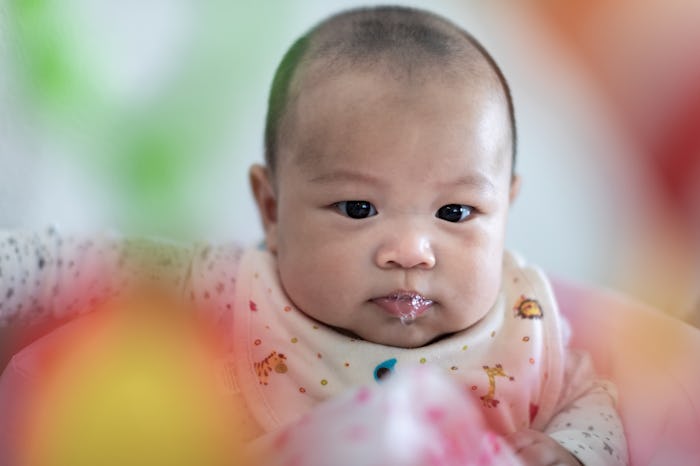Baby

There's A Good Reason For All Those Bubbles Your Baby Blows
Babies are full of adorably weird quirks. They put their feet in their mouths, smile at nothing (or is that gas?), and once they start drooling, you might notice your baby loves nothing more than blowing endless streams of messy raspberries. So why do babies blow bubbles? It turns out this sweet, sloppy activity may actually be a precursor to speech.
Why Do Babies Blow Bubbles?
“Milestones may develop at a slightly different time for each child but typically starting around 4 months of age you will start to hear raspberries or bubble making sounds,” pediatrician Dr. Alison Mitzner tells Romper.
Babies between the ages of 4 and 7 months begin to experiment with their mouths, and this includes making saliva bubbles. “Your baby will spend more time babbling and is learning to imitate sounds. Make no mistake, these are your baby's early attempts at speaking and should be encouraged as much as possible,” explained Kids Health. This is also the age when they start to recognize your speech patterns, and, on the later end of the spectrum, learn their names and even begin to associate words with objects.
“Babies often start blowing bubbles and drooling during the phase of development when teeth begin to emerge and when the mouth becomes an area of focus, setting the stage for speech and for eating solid foods later on,” pediatrician Dr. Whitney Casares tells Romper. Research shows that most children will get their first tooth around 6 months of age and will have all 20 teeth of 30 months, so you can expect to see your baby blowing bubbles at the six month mark or earlier.
Starting around 2 months, babies experience an increase in saliva (per Benioff Children's Hospital), which is what makes those frothy bubbles possible. And when they see that their parents or caregivers react positively to this new skill (seriously, how can you not laugh at babies blowing bubbles?), they want to do it more.
“They may first do accidentally and then love what they can do. You will see they like to practice and do this anytime,” Mitzner says. “Imitate with them, communicate with them. They are learning and practicing making sounds, learning movements of their mouth and fine motor movements.” So yes, filed under "weird things you do for your baby" is the fact that you probably should be blowing raspberries back and forth with your little one.
Generally, bubble blowing is a good sign. That said, "if your baby is excessively drooling or blowing bubbles, is having any difficulty breathing, or appears to be choking, seek emergency care right away," Casares tells Romper.
Not only is this new skill important for their physical development, it can also build social skills, Mitzner adds. If your baby smiles back at you when they’re blowing bubbles, they’re communicating with you, even if it’s in a very basic form. Studies have found a correlation between parent and infant social interactions and the development of language.
“Soon after this [bubble blowing] milestone, babies start babbling and [are] on their way to talking,” Mitzner says. Who knew spit bubbles were so important?
Experts:
Dr. Whitney Casares, author of "The New Baby Blueprint: Caring for You and Your Little One" and host of "The Modern Mommy Doc Podcast"
Dr. Alison Mitzner, board-certified pediatrician and family wellness expert
This article was originally published on